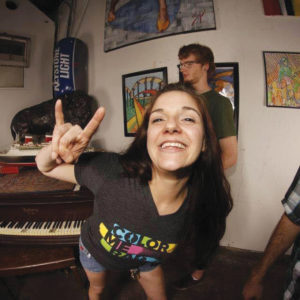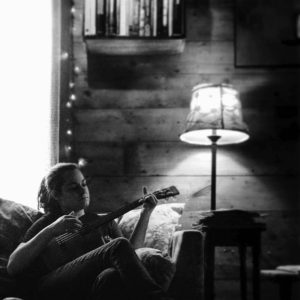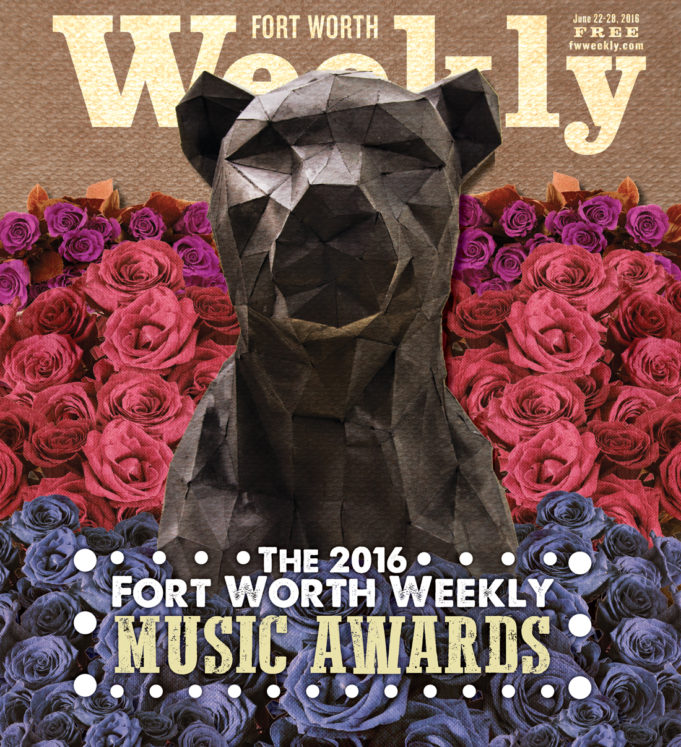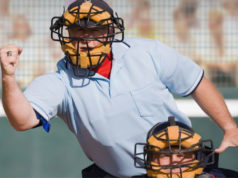Music Awards
For this year’s Music Awards issue, we decided to do something different. Instead of a couple of sentences about each nominee –– all nine million of them –– we thought we’d take the temperature of the scene, locally and internationally. How does a local artist define success and how does he or she measure it? Is Fort Worth becoming a destination for major touring acts? How does a local artist break through to that always elusive “next level”? Several nominees were willing to sit down and chat with us, and for their time –– and insight –– we are eternally grateful. Condensed versions of these conversations appeared in this week’s print edition.
And, of course, don’t forget that our 15th Annual Music Awards Festival is this weekend: 2-9pm Sat, Jun 25, on the Near Southside and 4-9pm Sun, Jun 26, in the West 7th corridor. For more info, check out our handy pocket guide, inserted into every issue of the Weekly on newsstands. Hope to see you there.
Congrats to all the nominees, and support local music wherever you are. –– Anthony Mariani
Women Who Rock
Who run Fort Worth? Girls. Although it might not be evident by looking at this year’s ballot. To discuss what it feels like for young women in the scene, Weekly contributor Jasun Lee sat down with three nominees working in different genres: Summer Dean, the honkytonking new gal on the block who recently completed a Sunday night residency at Magnolia Motor Lounge; Callie Dee, promoter galore for Red Empire and Right Round Productions; and Ansley Dougherty, singer for hard rockers Panic Volcanic.
Weekly: We’ve heard a good amount of chatter about the lack of female presence on the ballot this year, in particular removing the category of best Female Vocalist in favor of the gender-neutral best Vocal Performance. Is this something that stuck out to the three of you?
Ansley: Well, I have a pretty specific opinion on this, and I’ve felt this way for a long time, particularly in the genre of music that I play that has been dominated by men for a long time. Really how I feel is that this is pretty much OK with me. I’ve always been more interested in people seeing me not as a frontwoman but as an awesome frontperson and great singer. I don’t necessarily want my identity to come from the fact that I am a chick rocking out, although it does tend to shock people when they see me onstage doing what I do. I’m OK with being included with the boys. I want to be on an even playing field with everybody. I don’t want to be separate.
Callie: From the talent buying section of the scene, Red Empire has been a female-driven company from the start, but I would rather be noticed as a badass talent buyer as opposed to a chick who is doing what guys are doing. Being a woman in the hip-hop industry does have its disadvantages, just because at some point dudes might look at you differently just because they are trying to get in your pants, but we can overcome that just by showing them “Hey, I’m just like you. I love the music like you do. I have business skills like you.” Just because I am a woman, I don’t want to be seen as different than the guys that are doing it as well. I love seeing women uplifted, though, so I would like to see women recognized in their own category, but just because there isn’t one doesn’t mean I feel like we were shafted.
Summer: Right, there wasn’t a best Male Vocalist category either. It’s Vocal Performance. I appreciate the even keel.
Ansley: Another perspective I have is that I work with kids, and in our music scene women seem to make up maybe 5 percent of the musicians. That’s just how it is. At School of Rock, half the students are girls. That excites me. I think that in time the playing field will even out. Instead of being worried that we aren’t split into different categories, I just want to see more women playing music.
Summer: Some women might have seen it as marginalizing them to have a separate category. It’s lose-lose either way. I don’t feel that being a female in this scene is a hindrance. I haven’t felt that.
Weekly: Have any of you ever felt like you weren’t being taken seriously simply because females are such a minority in the scene?

Callie: For sure, especially in the hip-hop world that has such a misogynistic background to it anyway. Where it hinders me is that I am in a position of power. I get to tell people when they suck and decide if they should be on a show or not, and a lot of time dudes don’t take kindly to hearing negative comments from a girl. So when I am saying to them the same thing that a guy that has been around for a long time and is well-respected would say, I have to judge what I would say by their personality. If it is something I think they can handle coming from me, then I will just say it, but sometimes I know I am going to need one of my mentors to deliver the message, just so it’s relayed in a way where they don’t take offense. So yeah, I think there are times that I think I’m not being taken as seriously because I’m not a dude, but at the end of the day I have to rely on them knowing where my heart is and that I have good business sense.
Ansley: I don’t really experience a lot of flack for being a girl, and I guess mostly it is because I am able to prove myself to people. You know, I am a very powerful singer and performer in particular, so I don’t get a lot of that “Oh, she’s just a girl”-kind of stuff. I also think it has to do with me taking care of all of the business stuff with the band. I think that girls in music get a bad rap in general because people don’t immediately think they can play, but I don’t experience a whole lot of that just because I am a girl. I’ve been around long enough, and people respect me. They know who I am and that I am serious about what I do. I think that most people, at least in the rock portion of the scene, don’t have a problem with me being a girl. I also think that it has to do with me always being “one of the dudes” my whole life. Most of my friends have been guys, and I’ve always felt comfortable being one of the guys.
Summer: All three of us seem to be the kind of women that a guy is not going to take seriously anyway. We aren’t “typical chicks,” but we are still ladies.
Callie: We command respect. In a very lady-like fashion.
Summer: Instead of complaining or acting one way, focus on getting more shows. If you are good enough, strong enough, and you are serious, there won’t be any problems. You will get what you need.

Ansley: This makes me think of [Perfect Pussy], that band that played Dallas a couple of years ago that got really upset about someone who made a flyer for their show that had a naked chick on their flyer, and [a female member of the band] was saying [the designer was] trying to sexualize her music without consent. I think that we probably get some of that, especially in the rock genre, you know “sex, drugs, and rock ’n’ roll.” I’m not personally offended with that stuff in my work. Sometimes I put it there on purpose. We are all human beings, not some kind of robot or something.
Summer: Yeah, girls are sexy. We can be sexy and still be good at what we do. The real question is: If you are going to be a chick in the scene, what kind of chick are you going to be?
Callie: You have to have thick skin just to be in the music industry.
Ansley: There are always going to be people out there that don’t like what you do. There is nothing that distinguishes me as a female compared to my male counterparts as far as what I do musically. Just because I am a girl doesn’t mean I am doing anything differently other than sing in a higher range. I think men are shocked to see someone who is female get onstage and rock it like the boys do. I have no fear. I have no shame. I don’t over-sexualize myself onstage. I get out there, and I’m a powerhouse. I think that’s what surprises people, that I have the balls to get up there and rock like the boys do. There is this stigma that girls are more shy or they aren’t willing to step out there and be crazy, but I am.
Summer: If you take two badass drummers, one male and one female, it seems that the female would be more likely to get the gig because it’s cool that she is just as good as the boys.
Ansley: We have seen the popularity of the band Purple skyrocket lately. People are blown away that there is a chick behind the drumkit who is also singing and is able to command the attention of the crowd from the back of the stage.
Summer: It’s similar to a country music perspective. Look at the strong women in my genre: Tammy [Wynette] and Loretta [Lynn]. These are powerful women, but they are still really feminine. When I’m onstage, sure, sometimes I’ll wear tight dresses. That is part of my performance. Sex sells.
Callie: But it’s the same with a guy. If you see a good-looking dude onstage and then he sings well, raps well, plays well, whatever … it’s a plus.
Ansley: And people are more likely to not even give you attention if you aren’t attractive in the first place. It seems to me that this is very apparent in the hip-hop world. Callie, correct me if I’m wrong, but from what I’ve seen, all of the women in the genre have to do that. They have to use their sexuality to even be noticed.
Callie: Unless you are Missy Elliott.
Summer: Missy was the first person I thought of.
Callie: Right. You have your Nicki Minaj types that use their sexuality and then you have someone like Missy who gets up there and is just a badass. We have a 17-year-old girl in the Master of the Mic competition this year, and thank God she isn’t sexualizing herself. … You have to be extra dope if you aren’t going to go the sexualized route.
Summer: It’s nice to hear two other girls talk about getting turned off by someone just using their looks.
Callie: Don’t get me wrong, I think if you’ve got it and you want to flaunt it, go for it. I just don’t want to hear it when you act like that and then get upset when it is pointed out. Being a sexual human being doesn’t make you a whore. It doesn’t make you a slut. It just means you are comfortable in your own skin, and you should be able to portray that to the audience. I would never demean a female for using that to her advantage. Dudes do it all the time. How many R&B artists take off their shirts to serenade the females in the audience? Come on, men. You do it, too.
Ansley: I think that is the thing. Who cares if you wear a bikini onstage? I would not choose to do it because modesty tends to empower me more than nudity does, but as long as you’ve got the chops and as long as you can hold your own with your talent, skill, and hard work, then who cares!
Weekly: Which is where I was going next. Let’s discuss double standards or expectations to go beyond delivering just good work, maybe compromising your values, to get ahead of the game.
Summer: You know, in country music there is the whole angle of songwriting. There is a girl that has been kind of breaking out right now, and she has been called out a lot because she has babies and is also playing shows a lot and out on the road some of the time. I mean, this is a job. Men leave their kids at home to go tour all the time. … And that’s not the half of it in country music. I got approached the other day. I was told I had a low, sultry voice and that there is this whole man hatin’, pistol-slingin’ thing going on in country music right now. This man told me that if I could write him one of those “we broke up, I don’t need you”-kind of songs, he would believe me singing it more than someone like Miranda Lambert, because of the tone of my voice. So he says, “Go write me one of those songs.” At first I thought, “OK, business is business. Maybe I can give it a go.” So I sit down and started thinking about what it would take to write that song, and I just couldn’t. Mainly because I love men. I don’t hate men in general. I’m not mad. So sometimes it’s not all about female empowerment or how females need to rise up. And I get kinda offended when I’m expected to be a man-hater too. There are songwriters like Gillian Welch that don’t have to write man-hating songs, but they don’t have to write sappy little love songs either. I think it’s expected in my genre that if I’m not going to be super-feminine, I have to be tough. I don’t feel like I need to be either one.
Ansley: Ultimately, to me, it’s about the art. I’m not interested in writing about being a girl or whatever. I want to write about bigger issues. This whole new Panic Volcanic album we are working on now is about seeing people with all of these massive addictions and claiming them as part of their personalities as opposed to claiming them as things they need to fix. Things like this are more interesting to me. … I don’t really care about listening to songs about getting wasted and partying. That’s just not important music to me. I want to hear music about stuff that matters. As a writer, as a musician, I just can’t see myself writing about being a girl or referencing what kind of car I have. That’s just not me. I think it is more important to write about things I am passionate about, and the fact that I am a girl isn’t something that I am passionate about as an artist.
Callie: If a music label was trying to hire me as a promoter and they wanted me to use my sexuality to get ahead, being the business person I am, I would have to look at it –– obviously, I want to keep a good image; I don’t want to lead with sex –– but I would want to talk about dollars, see if it made sense to do. … I don’t put out music, so I don’t have that to follow me as a legacy. It’s more “What can I do for my artist?” Obviously I wouldn’t sleep with someone to get a position in the industry, because that is what you become. Once someone does something like that, everyone expects that of you. I want to be known as someone who gets things done. But I can’t say I wouldn’t be willing to use my sexuality if the money was there. I just wouldn’t let it be the reason I got there in the first place.
Summer: But we agree that as females we have to work differently and behave differently, right?
Callie: Oh, for sure. There is a higher standard. But I don’t hate it. I think that in society in general females are held to higher standards. Just like we said about a mother touring. No one would say those things about a father touring. They would call it “providing for his family.” But I don’t mind being held to a higher standard. I think that works out better for me.
Ansley: I think anyone who is trying to take themselves seriously in any industry has to hold themselves to a higher standard. I’m trying to gain the respect of my peers more than I am trying to gain the admiration of my peers. It matters very little to me how you think I look. I want to be respected as an artist.











